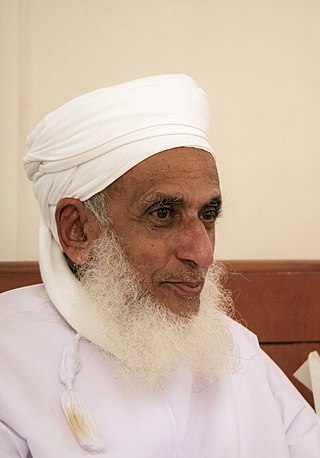
Sheikh Ahmad bin Hamad Al-Khalili (NP) is the Grand Mufti of the Sultanate of Oman.

The Consultative Assembly of Saudi Arabia, also known as Majlis ash-Shura or Shura Council, is the formal advisory body of Saudi Arabia. It is a deliberative assembly that advises the King on issues that are important to Saudi Arabia. It has the power to propose laws to the King of Saudi Arabia and his cabinet to prove it and pass it. It has 150 members, all appointed by the king and chosen "from amongst scholars, those of knowledge, expertise and specialists". Since 2013, the Assembly has included 30 female members out of the total of 150 members, after a 20 percent minimum quota for women was imposed. The Consultative Assembly is headed by a Speaker. As of 2016, the Speaker was Abdullah ibn Muhammad Al ash-Sheikh, in line with a tradition that kept the post in that family. The Assembly is based in al-Yamamah Palace, Riyadh.

Yusuf bin Alawi bin Abdullah is an Omani politician. He was the Sultanate of Oman's Minister Responsible for Foreign Affairs. It is important to clarify that "Ministers in Responsibility" were previously appointed as the Sultan was intended to hold the official position of "Minister of Foreign Affairs" himself.
The National Museum of the Sultanate of Oman is a museum located in Oman. It was developed as a result of a ten-year collaboration between the Ministry of Heritage and Culture, the Royal Estate Affairs of Oman, Jasper Jacob Associates (J.J.A.), and Arts Architecture International Ltd (A.A.I.), and opened to the public in 2016.

The Ministry of Justice and Legal Affairs (MJLA) was the governmental body in the Sultanate of Oman that is responsible for drafting legislation and providing other government bodies with legal advice. It was a distinct body from the Ministry of Justice and the Public Prosecution, and they were both merged into the Ministry of Justice and Legal Affairs in August 2020.

The Foreign Ministry is the government body in the Sultanate of Oman responsible for organising and directing Oman's relations with other countries and with regional and international organisations.
Abdullah bin Mohammed Al Saidi "عبدالله بن محمد السعيدي" is the current Legal Affairs Minister of the Sultanate of Oman and the Chairman of the Board of Directors of the Oman Charitable Organization. He has been the Minister of Legal Affairs since March 7, 2011.
Yahya bin Nasser bin Mansoor Al Khusaibi is the Undersecretary of the Ministry of Justice and Legal Affairs of the Sultanate of Oman.

The Ministry of Energy and Minerals (MEM) is the governmental body in the Sultanate of Oman responsible for developing and implementing the government policy for exploiting the oil and gas resources in Oman.

The Ministry of Heritage and Tourism (MOHT) is the governmental body in the Sultanate of Oman responsible for promoting and preserving Omani heritage and tourism.

The Ministry of Higher Education, Scientific Research and Innovation (MoHESRI) is the governmental body in the Sultanate of Oman responsible for supervising high education institutes and the development of high education policies in the Sultanate.

The Cabinetof Jordan is led by the Prime Minister who is appointed by the King. The Prime Minister is then free to form his own cabinet which is responsible to the Chamber of Deputies on matters of general policy and can be forced to resign by a two-thirds vote of "no confidence" by that body or be dismissed by the King.

The Ministry of Finance (MOF) is the governmental body in the Sultanate of Oman responsible for all government financial matters.

The Basic Statute of the State is the cornerstone of the Omani legal system and it operates as a constitution for the country. The Basic Statute was issued in the year 1996 and thus far has been amended twice: once in 2011 as a response to protests occurring during the Arab Spring, and once in 2021 to introduce procedures for the appointment of a crown prince and new rules for parliament.

Haitham bin Tariq Al Said is Sultan and Prime Minister of Oman.

The Ministry of Education(MoE) (Arabic: وزارة التعليم), before 2003 as the Ministry of Knowledge and until 1953 as the Directorate of Knowledge, is a government ministry in Saudi Arabia that is responsible for regulating primary, secondary and higher education in the country. It was established in 1926 by King Abdulaziz ibn Saud in the Kingdom of Nejd and Hejaz. Since the amalgamations of the General Presidency for Girls' Education (GPGE) in 2002 and the Ministry of Higher Education (MOHE) in 2015, it became the sole body which supervises all schools, universities and colleges in the country.
Ministry of Justice is a governmental body in the Sultanate of Oman. Established in 1970, the ministry is distinct from the Ministry of Legal Affairs and has the following objectives: It was merged into Ministry of Justice and Legal Affairs in 2020.

The Ministry of Finance & National Economy (MOFNE) is responsible for formulating and implementing the financial policies of the Kingdom of Bahrain within the overall vision of the Bahrain Government. The Ministry prepares the state general budget in coordination with other ministries and public entities in a way that reflects the financial and economic objectives of the Kingdom, particularly regarding improving living standards and increasing levels of economic growth.

Sayyida Ahad bint Abdullah bin Hamad Al Busaidiyah is the wife of the Sultan of Oman, Haitham bin Tariq.
The Ministry of Justice and Legal Affairs (MJLA) is the governmental body in the Sultanate of Oman responsible for drafting legislation, providing other government bodies with legal advice, and regulating the legal profession. It was the result of the merger of the Ministry of Justice and the Ministry of Legal Affairs in August 2020.











